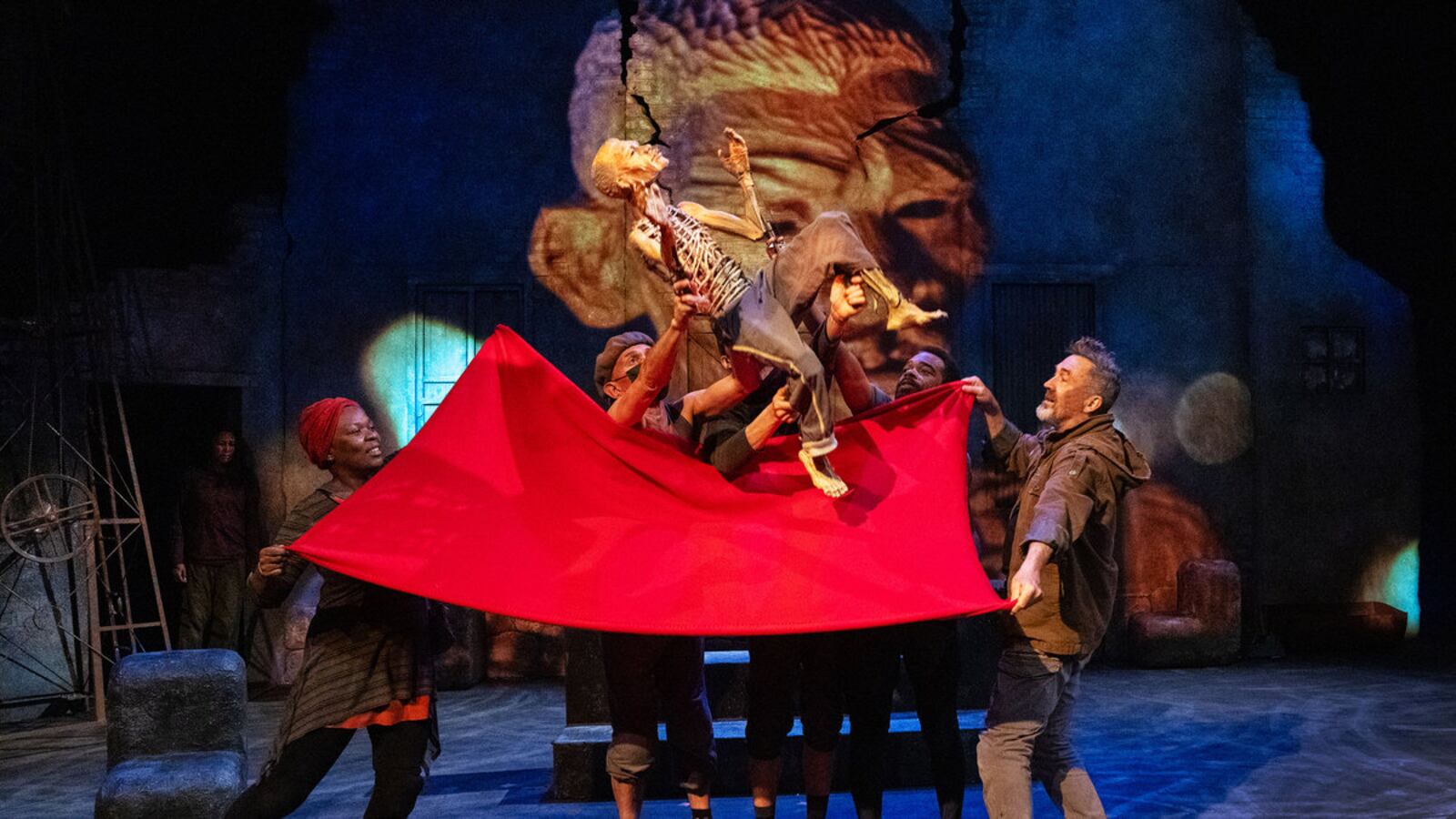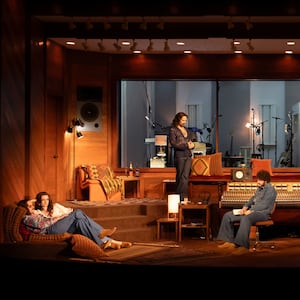Life & Times of Michael K
Spellbinding, heart-stopping, mind-freeing: Life & Times of Michael K (St. Ann’s Warehouse, to Dec. 23) is everything that theater should be, and can be if it is conceived and executed with the same intelligence and deftness of touch as adapter and director Lara Foot in collaboration with Handspring Puppet Company bring to this gorgeous and moving adaptation of J.M. Coetzee’s 1983 novel.
We follow the title character through the entirety of his life. On stage he is a half life-size puppet, operated by Craig Leo (puppet master), Markus Schabbing, and Carlo Daniels. Michael K’s story is one of brutal, gritty endurance. He seems to be rejected, and beaten down, and manipulated wherever he goes, and yet still he determinedly forms not just a life for himself—but a trajectory for himself, a direction, a literal and physical intent to move forward or indeed move anywhere in order to be free. The strongest theme of the production is Michael K’s focused exercise of pure, fierce independence, when all the forces around him seek to repress and coerce.
Basil Jones, the show’s puppetry director and co-founder of Handspring (best-known for its award-laden, London and Lincoln Center Theater productions of War Horse), writes in the program that Michael’s “consuming struggle is the struggle for the independence of being, but also in contrast, the need to belong—if only to the land and the landscape.”
Michael is born with a cleft lip, and this immediately—in the first gut-punch moment of the production—elicits rejection by his mother (a puppet operated by Faniswa Yisa, Roshina Ratnam, and Nolufefe Ntshuntshe). Her rejection is followed by the stares and cruel words of others, and yet Michael K doesn’t respond to it. He has things to do, and places to get to. As she gets sicker, his loyalty to his hard nut of a mother remains.
The beautiful staging of the show makes clear the hundreds of miles he travels to, for her and for himself. Around the puppets and their operators, an excellent company of actors (Andrew Buckland, Billy Langa, Wessel Pretorius, and Sandra Prinsloo) play a variety of friends, doctors, compadres, and tormentors.
Set at a time of a fictional civil war in South Africa, Michael’s challenge is to try to take his ailing mother back to her original home of Prince Albert. Denied—because of the demands of exhausting, obstacle-strewn paperwork—the opportunity to take her by train, he crafts a pram-meets-carts, which he drives himself. We see her death, her box of ashes, his onward journey to the far she had told him about—wherein, after a brief moment of true independence, exploitation by other family members begins anew.
Patrick Curtis’ black and dusty stage, Joshua Coutts’ shafts of light, and Yoav Dagan and Kirsti Cummings’ projections evoke the real, desert-like and blasted landscapes Michael must pass through, for his mother and then for himself. Every time Michael K is beaten or interned in a camp, he finds a way out, he must keep moving. Malnourished, he becomes sicker and more delirious, but his stubborn determination to live as he wishes remains. This, rather than any scrap of bread, is what sustains him.

'Life and Times of Michael K.'
Richard TermineThe puppeteers do an astonishing job of being present and yet recessive. We believe in the Michael K in front of us, and his journey—including an epic underwater struggle with a goat he wants to kill to eat. While the show is as intense and unsparing as it may sound, it also finds windows of clever and welcome wit, such as the moment when Michael K finally has some sustenance he begrudgingly shares it with his operators. Heartbreakingly, when he is brutalized, those same operators do all they can to keep their hands on him, to keep him safe, until they are forced away.
Michael K’s calling, it turns out, is to be a gardener—he tends to things, specifically gloriously spherical pumpkins, and they grow. And yet, in this endlessly, relentlessly corrupted society, this counts for nothing and even against him. His real home is taken from him, everything is taken from him, he becomes thinner and thinner—until there is not much left physically of him to beat or starve.
And yet, still there is Michael K’s indomitable spirit. He absolutely does not give in, and yet he does not grandstand about this strength of body and mind. He is who he is, and—through sheer tenacity and single-minded determination to live as he wishes he remains the biggest threat for the totalitarian state and authoritarian individuals who seek to bring him down.
This is a stunning production, and—amid the very many other, more conventionally glitzy offerings in New York—the only holiday-period show that you must do all you can to see. Michael K symbolizes hope of a very singular kind—not a ra-ra cheering hope, not a sentimental one either, but rather the hope intrinsic to a life lived with principle, direction and a fierce inner spirit—a life impressively well-lived, however a hostile world swirled so viciously around it.
Madwomen of the West
The one notable thing about Madwomen of the West (Actors Temple Theatre, booking through Dec. 31) is that it is a heap of transphobic garbage, keen to propagate its awful, ugly beliefs under the guise of humor. Truly, every single storyline swirling around the reunion of four old friends for a brunch that we keep being told goes terribly wrong (it does not, and it is hugely predictable) eventually loops back into obnoxious ramblings about, and jokes at the expense of, trans people, chosen names, and pronouns blah blah blah.

'Madwomen of the West.'
Carol RoseggA few dissenting words are said to offset some of it, but far from enough—and certainly not enough to divert from the fact that this one topic seems to be the play’s real obsession, rather than the far more interesting relationships between the friends. Most unforgivably, it wastes the talents of its excellent cast: Caroline Aaron, Brooke Adams, Marilu Henner, and Melanie Mayron. Still, if you want an hour-and-a half of anti-trans trolling, and the now familiar sound of bigots and bullies wearing the mantle of victimhood (Why must they be criticized for just voicing whatever prejudice they want to voice! Why I ask you!), then this is the play for you.







